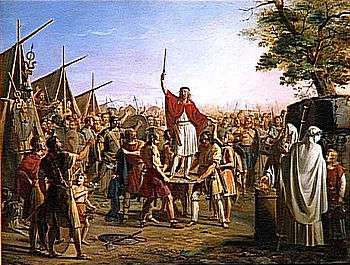420
This article is about the year 420. For other uses, see 420 (disambiguation).
| Millennium: | 1st millennium |
|---|---|
| Centuries: | 4th century · 5th century · 6th century |
| Decades: | 390s · 400s · 410s · 420s · 430s · 440s · 450s |
| Years: | 417 · 418 · 419 · 420 · 421 · 422 · 423 |
| 420 by topic | |
| Politics | |
| State leaders – Sovereign states | |
| Birth and death categories | |
| Births – Deaths | |
| Establishment and disestablishment categories | |
| Establishments – Disestablishments | |
| Gregorian calendar | 420 CDXX |
| Ab urbe condita | 1173 |
| Assyrian calendar | 5170 |
| Bengali calendar | −173 |
| Berber calendar | 1370 |
| Buddhist calendar | 964 |
| Burmese calendar | −218 |
| Byzantine calendar | 5928–5929 |
| Chinese calendar | 己未年 (Earth Goat) 3116 or 3056 — to — 庚申年 (Metal Monkey) 3117 or 3057 |
| Coptic calendar | 136–137 |
| Discordian calendar | 1586 |
| Ethiopian calendar | 412–413 |
| Hebrew calendar | 4180–4181 |
| Hindu calendars | |
| - Vikram Samvat | 476–477 |
| - Shaka Samvat | 341–342 |
| - Kali Yuga | 3520–3521 |
| Holocene calendar | 10420 |
| Iranian calendar | 202 BP – 201 BP |
| Islamic calendar | 208 BH – 207 BH |
| Javanese calendar | 304–305 |
| Julian calendar | 420 CDXX |
| Korean calendar | 2753 |
| Minguo calendar | 1492 before ROC 民前1492年 |
| Nanakshahi calendar | −1048 |
| Seleucid era | 731/732 AG |
| Thai solar calendar | 962–963 |
| Wikimedia Commons has media related to 420. |
Year 420 (CDXX) was a leap year starting on Thursday (link will display the full calendar) of the Julian calendar. At the time, it was known as the Year of the Consulship of Theodosius and Constantius (or, less frequently, year 1173 Ab urbe condita). The denomination 420 for this year has been used since the early medieval period, when the Anno Domini calendar era became the prevalent method in Europe for naming years.
Events
By place
Europe
- The legendary Pharamond leads the Franks across the Rhine. He re-colonises the old town of Duisburg (Germany).
- The Huns, under leadership of the brothers Octar and Rugila, expand their rule through neighbouring tribal groups.
Persia
- Yazdegerd I dies after a 21-year reign and is succeeded by his son Bahram V, who becomes head of the Persian Empire.
- Abdas, bishop of Susa, is accused of burning down one of the fire temples of Ahura Mazda.
Asia
- The Jin Dynasty ends in China. Liu Yu (Emperor Wu of Liu Song) becomes the first ruler of the Liu Song Dynasty. Nanjing is reinstated as the capital of northern China.[1]
- The Southern Dynasties begin in China.
Births
- Anthemius, emperor of the Western Roman Empire (approximate date)
- Ecdicius, Roman general (magister militum) (approximate date)
- Glycerius, emperor of the Western Roman Empire (approximate date)
- Libius Severus, emperor of the Western Roman Empire (approximate date)
- Majorian, emperor of the Western Roman Empire (approximate date)
- Palladius, caesar and son of Petronius Maximus (approximate date)
- Valamir, king of the Ostrogoths (approximate date)
- Yuan Can, high official of the Liu Song Dynasty (d. 477)
Deaths
- January 21 – Yazdegerd I, king of the Sassanid Empire
- February 26 – Saint Porphyry, bishop of Gaza (Palestine)
- September 28 – Eustochium, desert mother and saint (Approximate date) or (419)
- September 30 – Saint Jerome, priest and translator of the Bible
- Saint Abdas, bishop of Susa (Iran)
- Li Xin, duke of the Chinese state Western Liang
- Pelagius, British monk (approximate date)
- Orosius, Christian historian and theologian (approximate date)
- Yao, empress consort and wife of Mingyuan
References
- ↑ Bernard Grun, The Timetables of History, Simon & Schuster, 3rd ed, 1991. ISBN 0671749196
This article is issued from Wikipedia - version of the 11/7/2016. The text is available under the Creative Commons Attribution/Share Alike but additional terms may apply for the media files.
